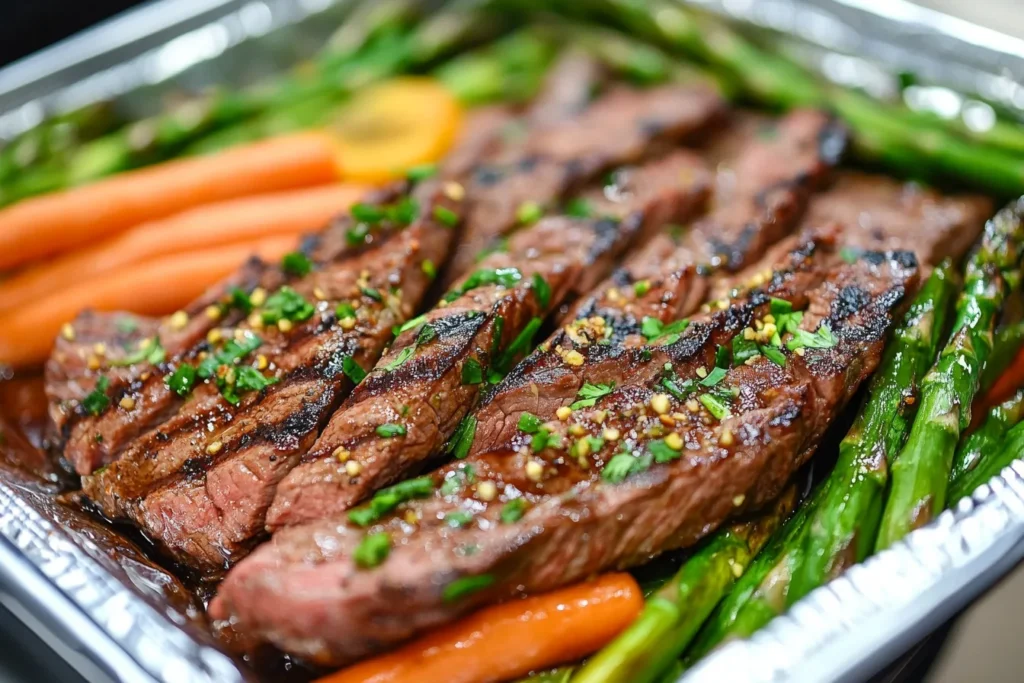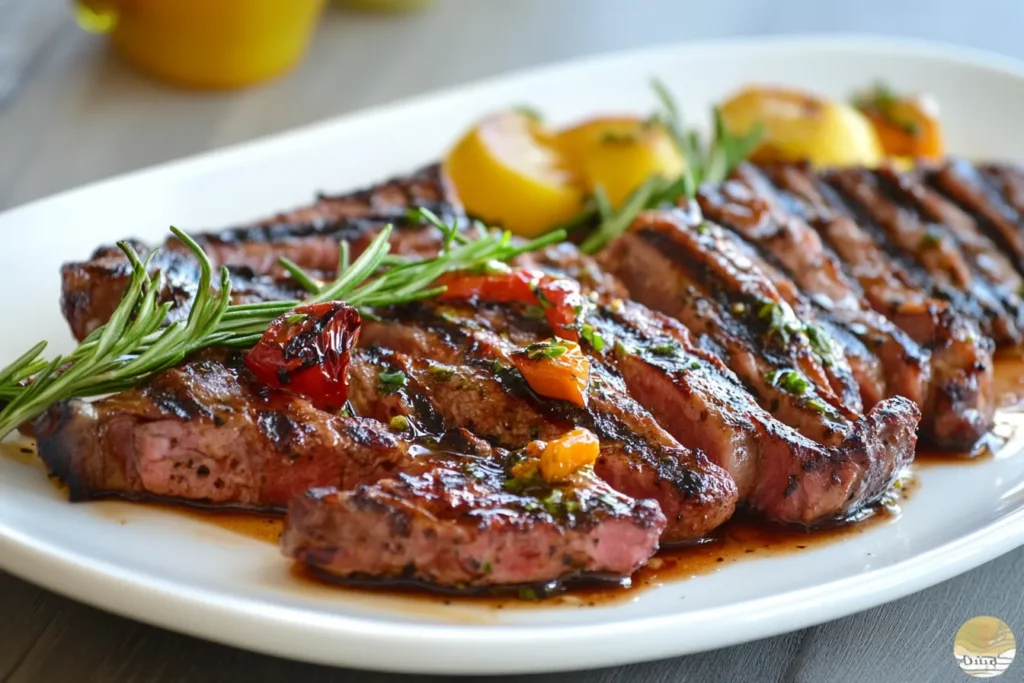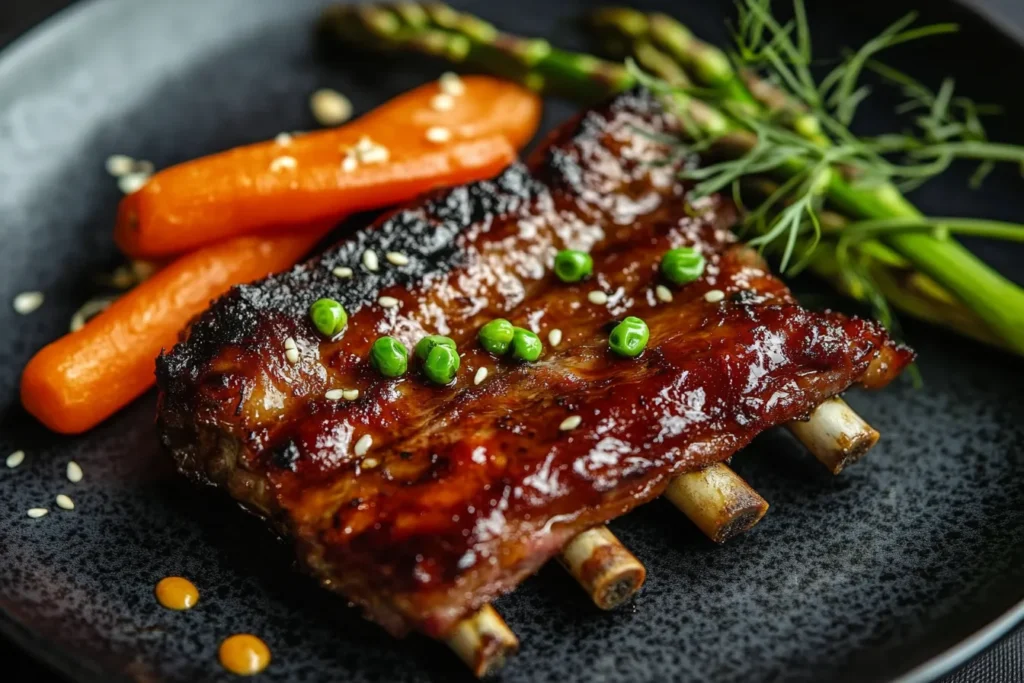Have you ever prepped a steak, poured on the marinade, and then wondered, “How long is too long to let this sit?” It’s a common question for home cooks who want their steak to soak up as much flavor as possible without accidentally ruining the texture. If you’ve ever worried about your steak turning mushy or not marinating long enough to make a difference, you’re not alone! The good news is, with a little guidance, you can time your marinating perfectly to get tender, flavorful results every time. Let’s break down the dos and don’ts of marinating steak, so you can cook with confidence and enjoy every bite!
List Of Contents
Introduction to Marinating Steak
Marinating steak is one of the best ways to take its flavor and texture to the next level. It involves soaking the steak in a flavorful liquid mixture for a specific period. But have you ever wondered how long you can marinate steak without overdoing it? Let’s dive into the key aspects of marinating steak, so you can get the most out of every cut. Check out more recipes here.
What Is Marination?
Marination is the process of soaking meat in a mixture of ingredients such as oil, acid, spices, and herbs. This mixture, known as a marinade, serves two main purposes: to enhance the flavor and to tenderize the meat.
The process is simple but effective. The marinade works by breaking down proteins and infusing the steak with a range of delicious tastes. This makes every bite more enjoyable. Check out more recipes here.
Why Marinate Steak?
Marinating isn’t just about flavor. It also improves the steak’s texture. By using the right marinade, you can:
- Add depth and complexity to the flavor profile.
- Soften tougher cuts of meat to improve their texture and make them more pleasant to eat.
- Prepare the steak for various cooking methods, such as grilling or pan-searing.
For example, a skirt steak becomes much more tender and flavorful when marinated properly, especially when using acidic ingredients like lime juice.
Key Factors Influencing Marination Time
The time needed to marinate steak varies based on several factors:
- The type of steak matters: thinner cuts soak up marinades quickly, whereas thicker cuts require more time.
- The ingredients in the marinade play a role: acidic marinades act fast but may over-tenderize the meat if left for too long.
- Refrigeration plays a role, as the temperature impacts how quickly the marinade penetrates the meat.
These factors dictate whether your steak needs a short 30-minute marination or a longer soak of up to 24 hours. Check out more recipes here.
Types of Marinades
It’s important to understand the various types of marinades, as each one impacts the steak in a unique way.

Acid-Based Marinades
Acid-based marinades contain ingredients like:
- Vinegar
- Citrus juices (e.g., lemon, lime, or orange)
- Wine
These marinades are great for breaking down proteins, which helps tenderize tougher cuts of steak. However, an excessive amount of acid can result in a mushy texture. So, use them carefully.
Enzymatic Marinades
These marinades include natural enzymes found in:
- Pineapple (bromelain)
- Papaya (papain)
- Kiwi
Enzymatic marinades are powerful tenderizers. While they are effective for tough cuts, they should be used for short marination times to avoid over-tenderizing the meat.
Oil and Spice-Based Marinades
If you want a balance of flavor without over-tenderizing, oil-based marinades are perfect. They include:
- Olive oil or other vegetable oils
- Herbs (e.g., rosemary, thyme)
- Spices (e.g., cumin, chili powder)
These marinades are ideal for steaks like filet mignon, where tenderness isn’t the main concern. Check out more recipes here.
The Science of Marination
Marinades do more than simply soak the steak in liquid; they enhance flavor and tenderness through a chemical process. It’s a chemical process that involves breaking down proteins and infusing flavor.
How Marinades Penetrate Meat
Marinades penetrate the outer layers of the meat, primarily through osmosis. This is why thin cuts of steak absorb marinades faster than thick ones. However, marinades typically don’t penetrate deeply into the meat unless the steak is scored or pierced.
Effect of Acidity and Enzymes on Meat Texture
- Acidic marinades, such as those containing vinegar, tenderize meat by denaturing its proteins. Excessive acidity can cause the steak to become rubbery or mushy.
- Enzymatic Marinades: These break down muscle fibers quickly, making the steak softer. However, leaving them on for too long can turn the meat into an unappealing mush.
Balancing Flavors: Salt, Sugar, and Spices
The perfect marinade strikes a balance:
- Salt enhances flavor and helps the marinade penetrate.
- Sugar enhances the flavor with a hint of sweetness and promotes caramelization while cooking.
- Spices add distinct flavors to the steak, enhancing its taste and making it unforgettable.
For instance, a marinade with soy sauce, garlic, and honey balances saltiness, savoriness, and sweetness perfectly.
How Long Can You Marinate Steak?

Ideal Marination Times by Steak Type
The ideal marination time largely depends on the type of steak you’re preparing. This is because each cut of meat has different textures, thicknesses, and levels of tenderness. Therefore, these factors significantly influence how long the steak should stay in the marinade to achieve the best results. Check out more recipes here.
Thin Cuts of Steak
Thin cuts, such as flank steak or skirt steak, marinate quickly because their surface area is large compared to their thickness. The marinade doesn’t need to work as hard to penetrate these cuts.
- Recommended Time: 30 minutes to 2 hours.
- Why This Works: Thin cuts absorb flavor quickly, and leaving them in the marinade for too long can overpower the natural meat flavor or make them mushy.
For example, marinating a skirt steak for fajitas in a citrus-based marinade for just an hour will impart enough flavor without ruining the texture.
Thick Cuts of Steak
Thick steaks like ribeye or T-bone require longer marination times because the marinade needs more time to work its way into the meat.
- Recommended Time: 4 to 6 hours.
- Why This Works: A longer marination period ensures the flavor is evenly distributed while maintaining the steak’s natural texture.
Tender Cuts of Steak
Tender cuts like filet mignon are naturally soft and don’t need a lot of tenderizing. These steaks benefit more from marinades that add flavor rather than texture changes.
- Recommended Time: 30 minutes to 1 hour.
- Why This Works: Since filet mignon is already tender, a short marination time enhances flavor without altering its natural qualities.
Tough Cuts of Steak
Tougher cuts such as chuck steak or round steak benefit the most from marination. These cuts are full of connective tissue and require more time for the marinade to break them down.
- Recommended Time: 12 to 24 hours.
- Why This Works: Tough cuts need the extended time to tenderize and absorb enough flavor to make them palatable.
Minimum and Maximum Marination Times
It’s essential to find the perfect balance when marinating steak. Too short a time and the steak might not absorb enough flavor; too long, and you risk ruining the texture.
Quick Marinades: 30 Minutes to 2 Hours
Quick marinades are perfect for last-minute meal prep. They work best with thin cuts or tender cuts that don’t need much tenderizing.
- Example: A quick soy sauce and ginger marinade for flank steak works wonders in just 45 minutes.
Longer Marinades: 6 to 24 Hours
When marinating thick or tough cuts, longer marination times are ideal. However, it’s crucial not to go beyond 24 hours, as the steak can lose its natural texture.
- Example: A red wine and garlic marinade for a chuck steak left overnight will break down the connective tissue for a more enjoyable bite.
Risks of Over-Marinating Steak
While marinating for too long might initially seem harmless, it can actually have several negative effects on your steak. For instance, over-marinating can:
- Make the Texture Mushy: Acids and enzymes may break down the proteins excessively, which ultimately leaves the steak soft, unappealing, and far from ideal.
- Overpower the Natural Flavor: The marinade’s strong flavors can dominate, which may mask or even entirely overshadow the steak’s natural taste.
- Increase Acidity: Prolonged exposure to an acidic marinade often results in an overly sour taste, making the steak less enjoyable.
Thus, it’s essential to strike the right balance to avoid these pitfalls.
Signs of Over-Marination
Knowing when you’ve gone too far with marination is just as important as knowing how long to marinate.
Mushy Texture
If your steak feels slimy or falls apart before cooking, it’s a sign that the proteins have been over-tenderized. This often happens with acidic or enzymatic marinades left on too long.
Loss of Natural Steak Flavor
Steak has a natural, robust flavor that should complement the marinade. Over-marinating can drown out this taste, leaving you with a steak that tastes artificial or overly seasoned.
Excess Acidity in Cooked Steak
If the final cooked steak tastes tangy or sour, it’s a clear sign of excessive acidity from the marinade. This often happens when vinegar or citrus-based marinades are used for too long.
To avoid these issues, always stick to the recommended marination times for your specific cut and marinade type.
Pro Tip: Taste Test the Marinade
Before committing to a long marination time, taste the marinade. It should be balanced with salt, acidity, sweetness, and spice. Adjusting these elements ensures your steak absorbs the right flavors.
How Long Can You Marinate Steak?

Practical Tips for Marinating Steak
Marinating steak is not just about soaking it in a flavorful liquid; rather, it involves several key practices that ensure your steak turns out perfectly every time. To achieve the best results, it’s important to carefully select the right marinade, store it properly, and avoid common mistakes. Here are some practical tips to guide you through the process.
How to Select the Right Marinade for Your Steak Cut
Every steak cut has its own texture and flavor profile, which means the choice of marinade should match its unique characteristics. Therefore, pairing each cut with the appropriate marinade is crucial.
For Thin Cuts:
Thin cuts like skirt steak or flank steak absorb flavors quickly due to their large surface area. As a result, bold and tangy marinades work exceptionally well.
- Recommended Marinades: Use mixtures with lime juice, soy sauce, or other acidic ingredients.
- Example: A garlic and chili marinade enhances the flavors of a skirt steak perfectly.
For Thick Cuts:
Thicker cuts, such as ribeye or T-bone, require marinades that penetrate deeper layers. Therefore, using a mix of acids and spices is ideal.
- Recommended Marinades: Opt for red wine, balsamic vinegar, or rosemary-infused mixtures.
- Example: A red wine and rosemary marinade adds depth to a ribeye without overpowering it.
For Tender Cuts:
Tender cuts, like filet mignon, benefit from light, flavor-enhancing marinades that don’t alter their delicate texture.
- Recommended Marinades: Use oil-based marinades with fresh herbs and subtle citrus elements.
- Example: Olive oil, thyme, and lemon zest are perfect for accentuating the natural flavor of filet mignon.
For Tough Cuts:
Tougher cuts, such as chuck or round steak, need marinades that focus on breaking down connective tissues. Therefore, enzyme-rich or highly acidic marinades work best.
- Recommended Marinades: Use ingredients like papaya, pineapple, or yogurt to tenderize the meat.
- Example: A pineapple-based marinade softens a chuck steak while adding a touch of sweetness.
Proper Storage During Marination
Proper storage is essential to achieving flavorful results while ensuring food safety. Without the right precautions, you risk both contamination and uneven marination.
Use Non-Reactive Containers:
Always marinate your steak in glass, stainless steel, or food-safe plastic containers. Avoid using aluminum, as it can react with acidic ingredients, altering the flavor and potentially affecting safety.
Refrigerate:
It’s crucial to keep the marinating steak in the refrigerator at all times. Marinating at room temperature can lead to bacterial growth, which is unsafe.
Seal Properly:
Always cover the container tightly or use resealable plastic bags. This prevents leaks, ensures even coating, and keeps the marinade from absorbing unwanted odors from the refrigerator.
By following these steps, you can enjoy a marinated steak that is not only delicious but also safe and perfectly suited to your chosen cut.
Do’s and Don’ts of Marinating Steak
Do’s
- Do Mix Ingredients Well: Ensure all marinade components are evenly blended for balanced flavor.
- Do Pat the Steak Dry Before Cooking: Excess marinade can prevent proper browning.
- Do Rotate the Steak: Flip the steak halfway through the marination time to ensure even absorption.
Don’ts
- Don’t Use the Same Marinade as a Sauce: If you plan to use marinade as a sauce, boil it first to kill any bacteria from raw meat.
- Don’t Over-Marinate: Follow the recommended times to avoid mushy textures and overpowering flavors.
- Don’t Skip Oil in the Marinade: Oil helps the flavors stick to the steak and improves browning during cooking.
Adjusting Marination Times for Cooking Methods
Different cooking methods require slight adjustments to marination times for optimal results.
Grilling
- Grilling steaks benefits from marinades with a balance of sugar and acid. Sugar helps with caramelization, creating a flavorful crust.
- Adjust marination time slightly longer (up to 24 hours for thick cuts) to ensure the steak holds up to the intense heat.
Pan-Searing
- Pan-searing requires dry surfaces for a good sear. Pat the steak dry after marinating and cook immediately.
- Use shorter marination times (e.g., 30 minutes to 4 hours) for tender cuts, as the quick-cooking process locks in flavors.
Sous Vide
- With sous vide, flavors penetrate deeply during the long cooking process. Marinate briefly (1-2 hours) to avoid overpowering the natural taste.
- Add fresh herbs or spices after cooking for an extra burst of flavor.
Safe Marination Practices
Food safety is as important as flavor when marinating steak. Follow these practices to keep your meal safe and delicious.
Avoiding Cross-Contamination
- Separate Utensils: Use different utensils for handling raw meat and cooked steak.
- Marinate in the Fridge: Never marinate steak at room temperature to prevent bacterial growth.
- Discard Leftover Marinade: If not boiled, leftover marinade can harbor harmful bacteria.
Using Leftover Marinade Safely
- If you plan to use the marinade as a sauce, boil it for at least 5 minutes to kill any bacteria.
- Alternatively, reserve a portion of the marinade before adding the steak and use it later for basting or drizzling.
FAQs
1. Can You Marinate Steak Overnight?
Yes, but only for certain cuts. Tough cuts like chuck or round steak benefit from overnight marination. For tender cuts, limit the time to 2-4 hours.
2. What Happens If You Marinate Too Long?
Over-marinating can result in a mushy texture, loss of natural steak flavor, and an overly tangy or sour taste.
3. Can You Marinate Frozen Steak?
Yes, but it’s best to thaw the steak first. Marinating frozen steak prevents the marinade from penetrating properly.
4. Do You Need to Rinse Steak After Marinating?
No, but you should pat it dry with a paper towel to remove excess marinade and ensure proper browning during cooking.
5. Can You Reuse Marinade?
Only if it has been boiled to kill bacteria from raw meat.
6. Does Marinating Tenderize Steak?
Yes, especially for tougher cuts. Acidic or enzymatic marinades help break down proteins and connective tissue.
7. Should You Salt Steak Before Marinating?
Not necessarily. Many marinades include salt, so pre-salting can make the steak too salty.
8. How Can You Tell If a Marinade Is Too Acidic?
If the marinade has a sharp tang or sourness, it might be too acidic. Balance it with sugar or oil.
9. Can You Marinate Steak Without Oil?
Yes, but oil helps distribute flavors evenly and aids in browning during cooking.
10. What’s the Best Way to Marinate for Meal Prep?
Place steak and marinade in a resealable bag and freeze. Thaw in the refrigerator, allowing the steak to marinate as it defrosts.
